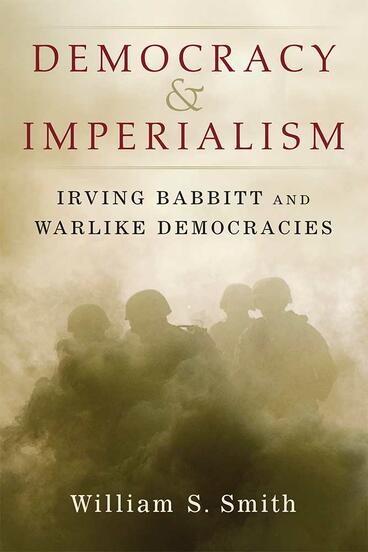Democracy and Imperialism
Irving Babbitt and Warlike Democracies
Examines political theorist Irving Babbitt’s analysis of foreign policy leadership, with implications for the future of U.S. diplomacy
Description
Following costly U.S. engagement in two wars in the Middle East, questions about the appropriateness of American military interventions dominate foreign policy debates. Is an interventionist foreign policy compatible with the American constitutional tradition?
This book examines critic Irving Babbitt’s (1865–1933) unique contribution to understanding the quality of foreign policy leadership in a democracy. Babbitt explored how a democratic nation’s foreign policy is a product of the moral and cultural tendencies of the nation’s leaders, arguing that the substitution of expansive, sentimental Romanticism for the religious and ethical traditions of the West would lead to imperialism.
The United States’ move away from the restraint and order of sound constitutionalism to involve itself in the affairs of other nations will inevitably cause a clash with the “civilizational” regions that have emerged in recent decades. Democracy and Imperialism uses the question of soul types to address issues of foreign policy leadership, and discusses the leadership qualities that are necessary for sound foreign policy.
William S. Smith is Research Fellow and Managing Director of the Center for the Study of Statesmanship at the Catholic University of America.
Reviews
“The author does a masterful job of laying out Babbitt’s views on the sources of imperialism in mistaken notions of human character and, especially, failures of personal and national self-control. The result is a substantial contribution to political theory properly understood, to our understanding of an important but too-little-known political philosopher, and most interestingly to the developing field of International Relations theory.”
—Bruce Frohnen, Ohio Northern University
“This book is timely in light of recent political developments that question the once unassailable normative status of liberal democracy. Babbitt develops a theory of the moral-cultural dangers associated with the democratic spirit. As an expert on Babbitt’s thinking and one who is versed in contemporary IR theory, Dr. Smith is well-positioned to serve this need.”
—Ryan R. Holston, Virginia Military Institute
"Every so often a new book provides a perspective on a well-known and much argued topic that compels readers to rethink how they view political life. William S. Smith's Democracy and Imperialism: Irving Babbitt and Warlike Democracies is such a book. It cuts against the grain of the view, shared by liberal internationalists and neoconservatives, that democracies are inherently peaceful and that they are immune to imperial inclinations and behavior because they are born in resistance to tyranny."
- Michael P. Federici
-- Modern Age
"This is the Babbitt syllabus, familiar to his aficionados (the few, the proud), and Smith does a fine job of laying it all out. Where his book really shines is in taking this reasoning and applying it to America’s senseless foreign policy.... It’s past time we examined the moral roots of our foreign policy crisis, and Smith’s book is a valuable guide to doing so." - Matt Purple, The American Conservative
- Matt Purple
"[Democracy and Imperialism] provides a thorough, careful, and astute analysis of Babbitt's conception of foreign policy. This is no small feat: although a powerful intellect, Babbitt was also a difficult writer whose meandering prose can lead lesser critics astray. It is a testament to Smith's book that it supplies a consistently reliable exegesis of its subject."
- Eric Adler
—Society

